Matt Groening’s Disenchantment takes him to fantasy land
He tackled suburbia and made history with The Simpsons. Now Matt Groening has taken on Game of Thrones.
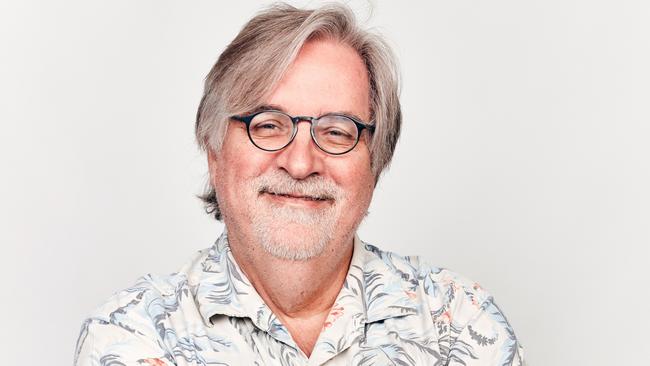
When Matt Groening was growing up during the 1960s in Portland, Oregon, television shows such as Leave It to Beaver and Father Knows Best portrayed an idealised American family that jarred with his experience of real life.
In those series, no one behaved unpredictably or said inappropriate things. So, in 1989, Groening delivered a cultural broadside with a family of four-fingered yellow misfits called the Simpsons — based on his own, which did both.
The multi-award-winning series, whose 29th season just finished screening here, redefined television, pop culture and global perceptions of the American family. Groening went on to create the animated sci-fi sitcom Futurama in 1999, which never reached the same heights of success, but nonetheless ran for seven seasons.
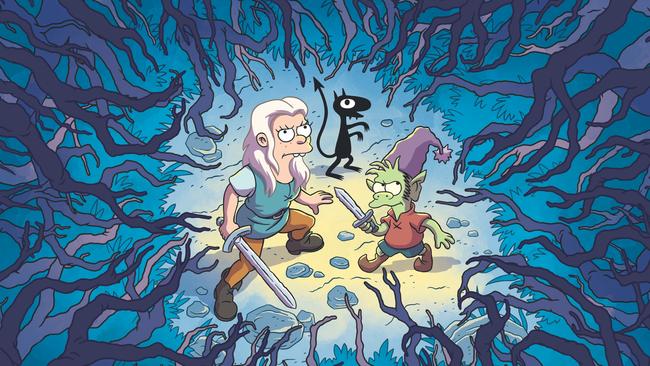
Now the same subversive spirit that made Groening’s reputation has inspired a new animated series titled Disenchantment — a rollicking medieval tale that sends up the fantasy genre. “I’ve actually loved fantasy and fairytales since I was a kid,” says the 58-year-old, speaking to Reviewfrom his home in Santa Monica, Los Angeles. “But in a way, this is a reaction against the big blockbuster TV shows like Game of Thrones, and The Lord of the Rings.”
But it’s not just a case of highlighting the inherent silliness of elves or the dangers of a throne made of swords. Groening has done something far more subversive than almost any animated comedy before: created a strong, multidimensional, lead female character.
Princess Bean, voiced by Abbi Jacobson (star of Broad City on Foxtel), is the hard-drinking young heiress of the medieval kingdom of Dreamland. Desperate to avoid the dull prospect of a royal marriage, and eager to chart her own path in life, Bean is befriended by an elf named Elfo (Nat Faxon) and by her “personal demon”, Lucy (Eric Andre), who accompany her on her adventures.
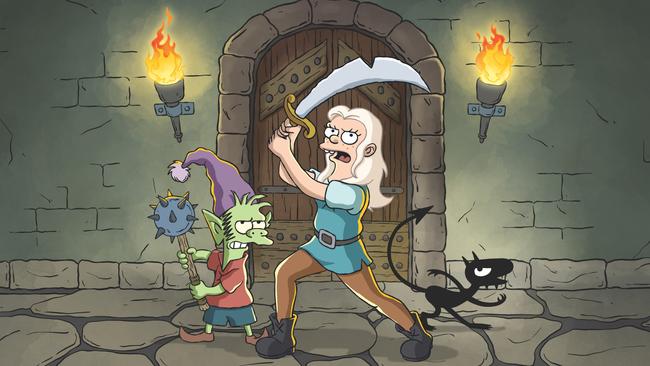
“I love Princess Bean — she is the centre of the series, and we tried to make her look unlike any cartoon princess you’ve ever seen before: she is unconventionally beautiful, but I still think audiences will fall in love with her,” Groening says.
“Abbi really brought the character to life — in addition to the very good scripts, she is a brilliant improviser, which added a feminist component to the character which took the show up an extra notch.”
(Jacobson says: “I like that she’s always getting in trouble and has a mind of her own. I feel very lucky to play a character that isn’t anywhere near perfect.”)
But Groening hastens to add that the origin of his female lead character lies in a decade of research into the fantasy genre; it’s not a consequence of getting caught up in the #MeToo zeitgeist sweeping the entertainment industry.
“This goes back to how fairytales were, historically. What people don’t notice is that the weak people in classic fairytales are the men, and the powerful people — for good or evil — are women or children (or childlike people like elves or dwarfs),” he says.
“What’s amazing about female characters in classics and Disenchantment is that, whether kind-hearted or wicked, they take risks, they talk back and they eventually get what they want.”
In any case, the zeitgeist can be a double-edged sword. Controversy has stalked Groening and The Simpsons’ long-time showrunner Al Jean in the past year over that show’s Indian Kwik-E-Mart proprietor Apu, voiced by Hank Azaria, after a documentary last year by American comedian Hari Kondabolu labelled the character a racist stereotype.
It’s a topic about which Netflix has been extremely leery. The Netflix representative connecting Review’scall to Groening insisted he was not to be asked any questions about The Simpsons or Futurama; a blunt refusal led to those demands being dropped.
Other journalists report similar experiences. Brad Wheeler, an entertainment writer for Canada’s The Globe and Mail, said on Twitter: “Netflix stipulated that I not ask Groening about Apu controversy. I asked Netflix, ‘Is Matt declining to comment on Apu?’ They declined to answer that, so I went ahead and asked Matt about Apu. Netflix halted the interview immediately and disconnected the call.”
Groening said earlier this year: “I’m proud of what we do on the show [The Simpsons]. And I think it’s a time in our culture where people love to pretend they’re offended” — comments he has been forced to parse and defend repeatedly.
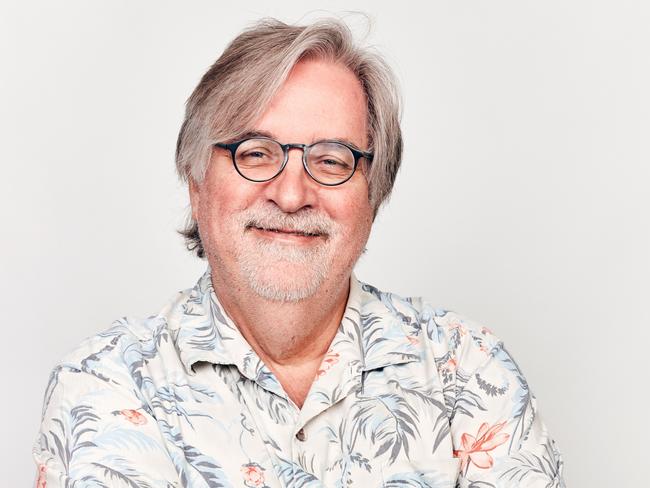
Jean was seen to deliver his response in dialogue in an episode of the most recent season titled No Good Read Goes Unpunished. “Something that started decades ago and was applauded and inoffensive is now politically incorrect. What can you do?” asks Lisa. A photo of Apu appears. “Some things will be dealt with at a later date,” says Marge. Adds Lisa: “If at all.”
While many of the voices in Disenchantment will ring with familiarity for fans — from John DiMaggio, Tress MacNeille, David Herman and Maurice LaMarche to Billy West, plus British newcomers Matt Berry, Noel Fielding and Rich Fulcher — there are noticeable visual differences. Absent is The Simpsons’ yellow-hued skin, a technique originally conceived to ensure channel surfers would instantly recognise the show. “First of all, technology has changed and you can now do many more things in animation,” Groening says.
“We worked with the same animators who did Futurama and The Simpsons Movie — Rough Draft Studios. In the beginning, we tried to figure out the boundaries of what they’d be capable of, but they really stepped up and just got better and better. The show is the best-looking thing I’ve ever worked on.”
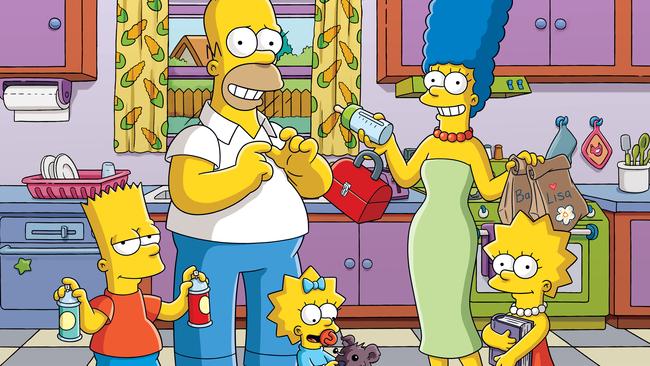
Leaving behind the medium of broadcast TV for streaming has also changed the storytelling possibilities. In The Simpsons, for example, no one ever ages and nothing ever changes, which means audiences can miss episodes without missing out on crucial information, allowing re-runs to be shown interchangeably ad infinitum. Gone too are the celebrity cameos, which Groening says was “the network trying to goose up interest halfway through the season”.
“There are no commercial breaks to accommodate, and audiences can binge all 10 episodes in a row, so we didn’t have to tell stories the old-fashioned way,” he says.
“Ultimately it’s a very long story, a serialised epic comedy adventure tragedy love story … I’m running out of nouns.”
Also, as a challenge, Groening has layered in far more meaning in this series than may superficially appear to be the case.
“I will say this: if you do a fantasy series you’ve gotta have Easter eggs [hidden clues, jokes and references]. Moreover, in fantasy, things are never what they seem to be,” he says.
“There are clues that are very obscure, and I will be very surprised if anyone figures them out, and there are some things that are staring you in the face from the first moments of the show, and we’ll see if people pick up on it.
“If you don’t get it, the show is still fine; but if you are an obsessive fanatic, you will be rewarded for paying attention, as we’ve loaded it with little stuff that will pay off later.”
But some references will be very obvious to fans of Game of Thrones.
The maiden episode features a royal wedding set in a medieval land, with the bride and groom standing before a throne made of melted-down swords, perhaps Thrones’ most recognisable motif.
Suddenly, the groom drops the wedding ring. As he scrambles to recover it, it rolls under the throne and he impales his head — yet he fails to die and continues talking and complaining from that uncomfortable, doubled-over position for some time, while his younger brother takes his place at the altar. (The Red Wedding it ain’t.)
Groening’s ability to catch lightning in a bottle for a third time is an open question, as he readily acknowledges, though he is generous in his praise for the animated comedies now in the vanguard of the genre.
“It’s a great age for animation, I love Rick & Morty and Bojack Horseman, they’re both fantastic. Bob’s Burgers and Gravity Falls too,” he says.
“The TV animation that we grew up with definitely had a sameness about the visuals, and what I am really gratified by is that all these shows don’t look like anyone else’s. Nobody is imitating other people.”
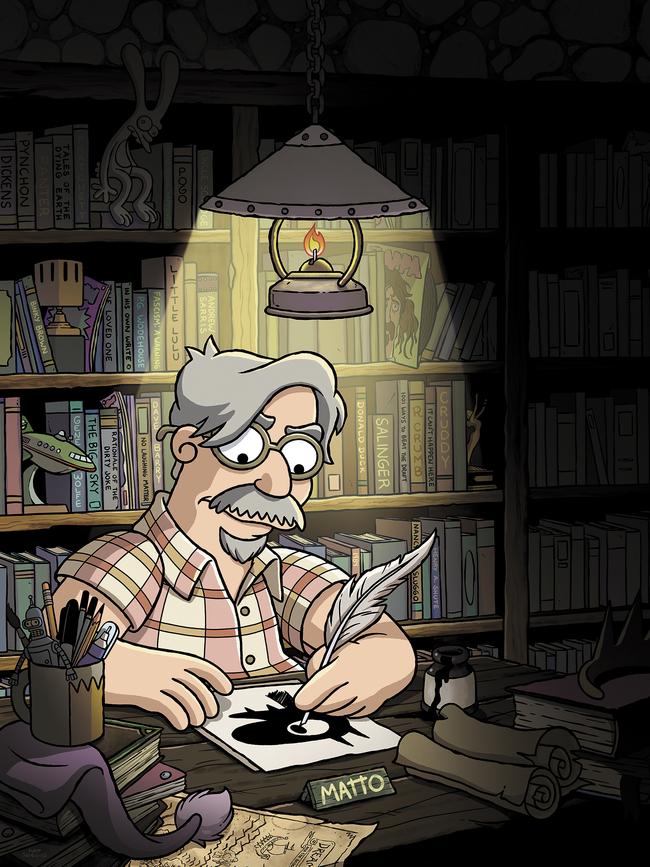
Groening describes his childhood in the 50s and 60s in Oregon as “idyllic”. His father, Homer — many of the characters in The Simpsons were named after his family — was a cartoonist and filmmaker, and the Groening home was “inundated with pop culture”. After high school he attended a liberal arts college in Washington State where he met Lynda Barry, with whom he headlined the Graphic Festival at the Sydney Opera House two years ago.
“I love Lynda, she is one of my favourite people, but if you had told me that 40 years later we would be speaking together at the Opera House, we would have said: ‘What are you on?’ We had such as good time in Australia, I want to come back.”
Groening has found regular grist for his creative process by continuing his lifelong habit of drawing. “Yes, I draw every day, and one of the fun things about having this new show is getting to draw new characters; I can draw The Simpsons and Futurama characters with my eyes closed, but these new characters I haven’t quite got the hang of yet,” he says.
Groening says his “whole goal” when he moved to Los Angeles in the 70s was to get closer and closer to the ocean. He now lives in Santa Monica with his wife, Argentinian artist Agustina Picasso, and their children.
“I know that comfort and privilege are not conducive to good storytelling. So what do you do when you’ve had a couple hits? There is a struggle, because you don’t know if you can do it again and you might fall flat on your face,” he says.
“But the flip side is I am more confident now because I know I can work with a bunch of different people and make something I’m happy with.
“Also, I try to dress like I did when I had no money. You see comedians who have some success and start strutting around all dressed up and I think: ‘No, no, that’s not as charming.’ ”
Disenchantment premieres on Netflix on Friday.
The Aussie rapper in the writing room
Even in one’s wildest fantasy, it would be hard to surpass the improbability of indigenous rapper Adam Briggs (pictured left) sitting across the table from Matt Groening in the Disenchantment writers’ room. The 31-year-old, who grew up in Shepparton, Victoria, and is best known as one half of ARIA Award-winning duo A.B. Original, first contacted the show’s executive producer Josh Weinstein via social media.
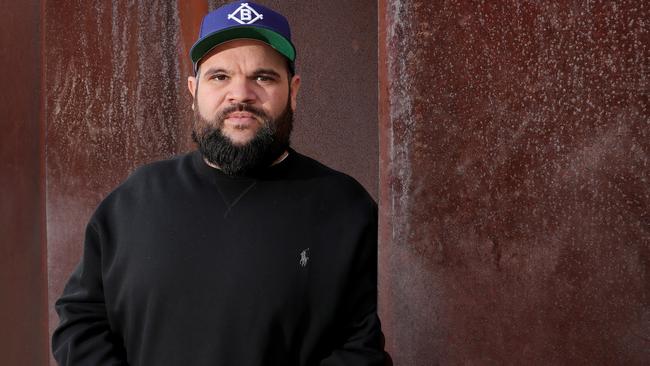
He was, like, a fan of my music, and I was a fan of The Simpsons, that’s how we got talking,” he tells Review from Melbourne. “I was asking all the nerdiest Simpsons questions — ‘Which character was the hardest to write? What is your favourite episode?’ — and he was happy to answer them. I just fanboyed out.”
Briggs, who has written and performed in Australian television shows such as Black Comedy, Get Krack!n and The Weekly, and watched every episode of The Simpsons and Futurama (with director’s commentary where possible), says Weinstein invited him to drop by the office in Malibu to discuss a new project.
“It was such a cliched moment: I was tapping away on a laptop in the office and this hand comes across my screen, and I look up at Matt Groening, and behind his head is a skylight, and it’s like an aura coming off his head,” he says.
But if Briggs was intimidated, it was only momentarily. Groening says: “He sat down with us and added a perspective that was completely, completely different where we were coming from, that’s for sure.”
Briggs too recalls the moment, which he is reluctant to over-describe and spoil for audiences. “Something was happening in my episode where the characters were acting one way, and I just said, ‘Nah, nah, nah, that has to change’,” he says.
“It was a really big moment for me, I was expecting a huge silence, because in my mind I’m sitting there with giants; in their minds, everyone at the table is there for a reason. And I figure if I can walk out and perform in front of 40,000 people, I can speak up at a table of six.”
Briggs is proud of the results (“Yeah, man — when I first saw it, I thought, ‘Holy shit, this looks beautiful’.”), and says that although music will always be a part of his life, he thinks writing will become a bigger focus.
“You all thought I was wasting my time watching The Simpsons — now look at me,” he says.
Groening adds: “He was a delight, a really funny and sweet guy. He did great writing and if we come back with another season, we hope he can come back.”
“That’s what you want to hear from your boss,” says Briggs.


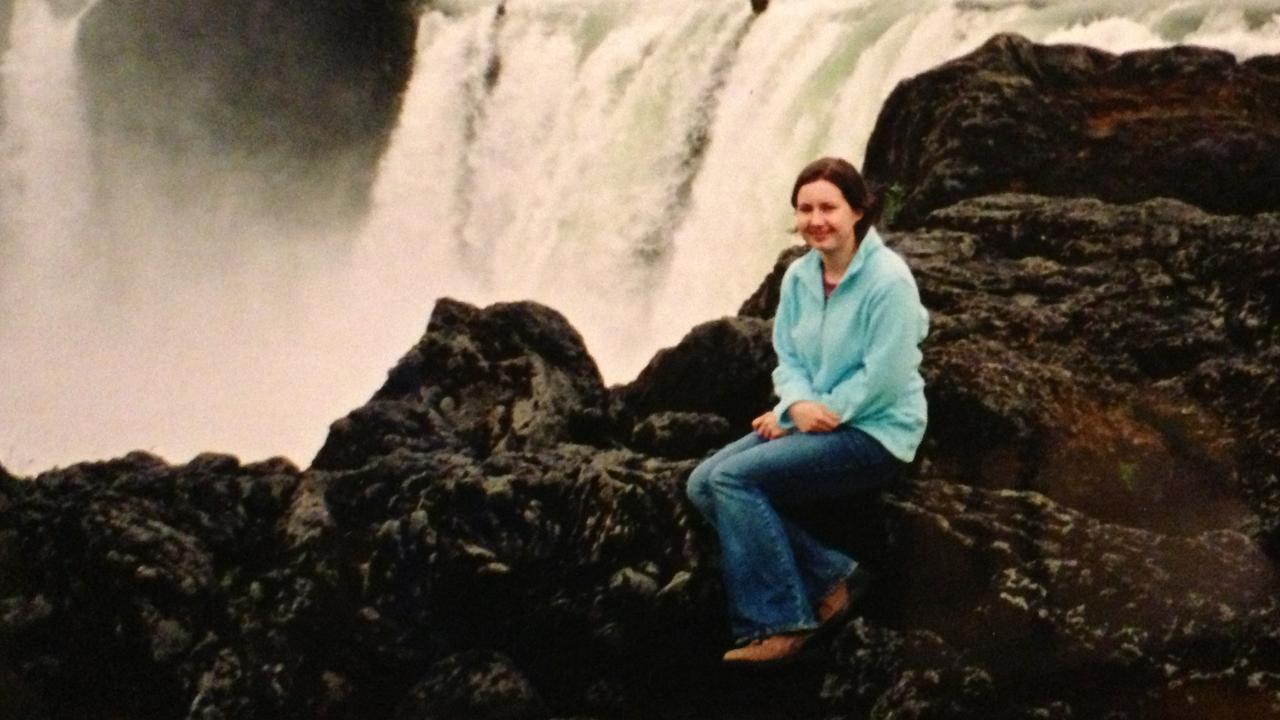
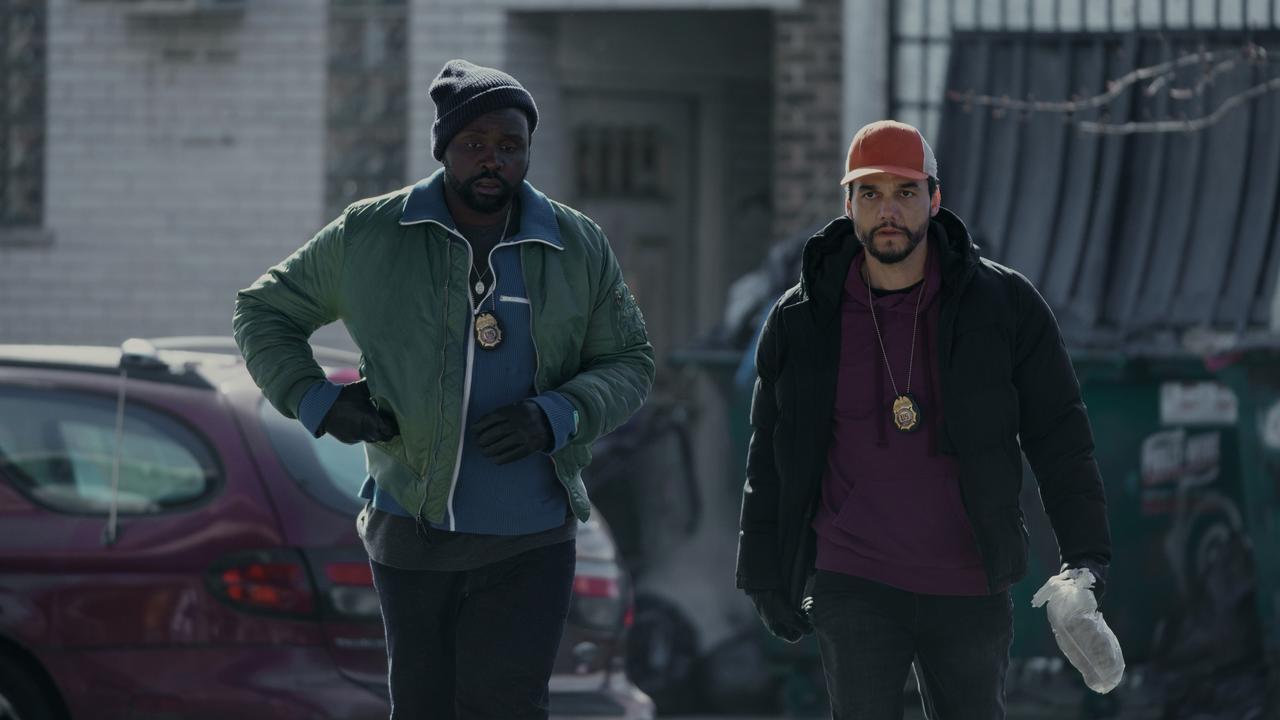
To join the conversation, please log in. Don't have an account? Register
Join the conversation, you are commenting as Logout